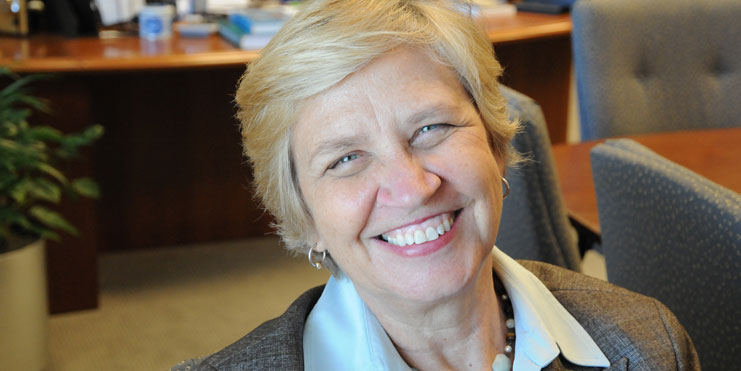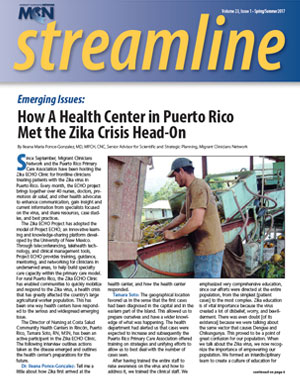Bettering the Lives of Workers: Profile of Linda McCauley

Linda McCauley, RN, PhD, FAAN, FAAOHN
By Claire Hutkins Seda, Writer, Migrant Clinicians Network, Managing Editor, Streamline
[Editor’s note: This article is part of a series on the lives of members of Migrant Clinicians Network’s External Advisory Board. Learn more about the board at http://www.migrantclinician.org/about/external-advisory-board.html.]
In the world of environmental and occupational health, there are few nurses. And that’s a shame, says Linda McCauley, RN, PhD, FAAN, FAAOHN, a leading researcher on environmental health among underserved populations. She believes the gap between primary care and public health should be closed -- beginning with the curriculum presented to our future medical providers. “We cannot do public health without the primary care workforce,” Dr. McCauley asserted. Environmental exposures -- about which Dr. McCauley is an expert -- is a leading example of this disconnect. During an appointment with a pregnant patient, for example, “you know what’s important for prenatal care -- and part of it is environmental. We talk about firearms, alcohol consumption, and where they live,” but what chemicals are our patients exposed to, and do we have the training to tease out when it’s a health concern? Dr. McCauley has spent her career adding to the literature on the question.
From Reproductive Health, to Environmental Health, to Planetary Health
After earning her nursing degree at the University of North Carolina in Chapel Hill, she earned a graduate’s degree in children’s health, feeding her interest in maternal and child health. Soon after, she began studying how environmental influences have reproductive health effects. Her focus then sharpened onto the environmental and occupational health piece. “I’ve always loved studying chemistry -- and how the body responds to chemicals in the workplace, in the environment,” she noted. This interest led her to Oregon, where she received her master’s in nursing and stayed on the West Coast to work with veterans exposed to chemicals. She then began a research program in coordination with the local Migrant Head Start, where she studied pesticide exposure in mobile or seasonal agricultural worker families.
What brought her to begin studying the effects of environmental exposures specifically on minority communities? “I think it was the nursing,” she replied, an urge to make sure that primary care providers are given the best information to serve their patients who are exposed to chemicals.
Dr. McCauley’s work and her lifelong love of learning brought her back to school to earn a doctorate in environmental health. Dr. McCauley continued her research projects focused on the environmental impacts of workplaces of the underserved. Her dedication has been recognized and continued through her appointment as Dean and Professor at the Emory University Nell Hodgson Woodruff School of Nursing in Atlanta, GA.
Decades of research later, her current project still hovers on the same concerns, this time in Florida. In collaboration with the Farmworker Association of Florida, she is currently working on a project entitled Los Girasoles (Spanish for “sunflowers”), which studies the impact of heat exposure on agricultural workers’ health.
“The symptoms of heat exposure are really similar to those of pesticide exposure, and clinicians need to understand that,” she noted. “And there’s no place that they learn it.”
Los Girasoles, funded by the National Institute for Occupational Safety and Health (NIOSH), is a four-year project that aims to better understand how agricultural workers respond to heat stress and to garner more complete data on the magnitude of heat-related illnesses like heat stroke in agricultural work. These data will be even more critical as global temperatures continue to rise, replies Dr. McCauley. Agricultural workers, susceptible to heat-related physiologic responses due to exposure to sun, heat, and humidity over many working hours, have a heat-related death rate nearly 20 times greater than the overall US civilian workforce, according to Los Girasoles.
Dr. McCauley recognizes that the data are highly relevant in the primary care world. “Clinicians want to hear what we’re learning about these ‘healthy’ workers and how their body can become so degraded, so quickly,” as a result of prolonged heat exposure, she said. As an example, occupation is now considered a risk factor in the recent and ongoing epidemic of chronic kidney disease of unknown etiology, as agricultural workers exposed to many conditions including extreme heat and dehydration are showing a decrease in kidney function. Those in the primary care world need to know the latest data, Dr. McCauley insists, in order to better recognize and treat environmental illnesses.
In addition to a synchronization of primary care and public health, Dr. McCauley advocates for a reframing of environmental health to a broader, more inclusive “planetary health” -- a term that is based in an understanding that human health depends on the health of the natural systems in which it thrives. This more inclusive, multidisciplinary term calls out our interdependencies and brings preventative care to a new level -- by viewing ecosystem degradation as a risk factor for human health concerns.
Connection to MCN
Dr. McCauley believes that organizations like MCN serve as critical links between the public health and primary care world, by bringing updated information to frontline clinicians. “MCN brings me back to my roots as a nurse,” Dr. McCauley says.
Dr. McCauley has worked closely with MCN’s Amy K. Liebman, MPA, MA, Director of Environmental and Occupational Health, for decades, including in the Occupational Health section of the American Public Health Association. “Dr. McCauley is such an important colleague and contributor to the science that helps us better understand agricultural worker exposures,” said Liebman. “Her nursing background adds an important perspective to her work and ultimately fuels her passion to engage clinicians and help prepare them to better address the environmental and occupational health needs of their patients.”
Dr. McCauley now serves on MCN’s External Advisory Board, a peer technical and scientific committee established to promote cross-disciplinary collaboration. Dr. McCauley is also a member of the Streamline External Editorial Board, reviewing the environmental and occupational health portion of the publication for accuracy and relevancy.
“We are fortunate to collaborate so closely with Dr. McCauley. She understands the important work that MCN does and pursues partnerships and collaborative efforts so that we can expand our collective impact. ” Liebman said.
Read this article in the Spring/Summer 2017 issue of Streamline here!
Sign up for our eNewsletter to receive bimonthly news from MCN, including announcements of the next Streamline.
Return to the Streamline Spring/Summer 2017 Table of Contents.
